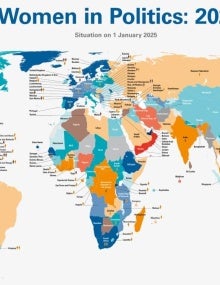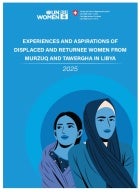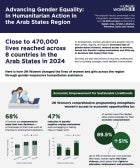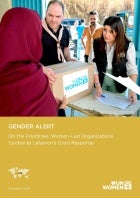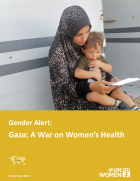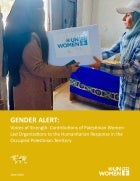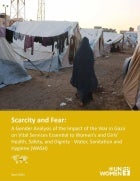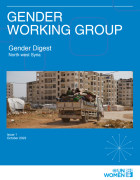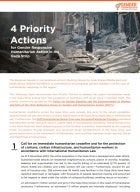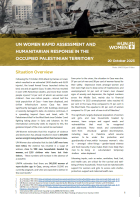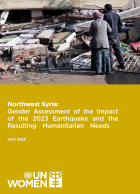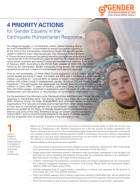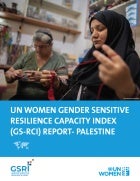1 - 20 of 56 Results
Pagination
Date:
This report examines the experiences of displaced and returnee women from Murzuq and Tawergha, focusing on their paths to durable solutions after years of displacement. Employing a mixed-methods approach, it reveals that many women have faced multiple displacements due to ongoing conflict, with limited access to services in displacement and upon return. While a significant portion desires to return home, infrastructure challenges and family pressures complicate their decisions. The report underscores the urgent need for targeted support and strategies to address the unique challenges faced by these women, fostering stability and empowerment in their communities.
Date:
Women and girls in emergencies face heightened risks, such as violence, limited access to services, and lack of decision-making power. Despite these challenges, they are crucial to recovery and building resilient communities.
Date:
Driven by the intensifying conflict, the recent escalating humanitarian crisis in Lebanon, has taken a profound toll on people’s lives. On the frontlines of the crisis response, women-led organizations (WLOs) are delivering critical, life-saving humanitarian assistance to affected populations, including women and girls in need.
Date:
The UN Women report Gaza: A War on Women’s Health reveals the devastating impact of Gaza's ongoing conflict on women’s health. With health facilities destroyed and thousands of women unable to access critical care, the report highlights urgent needs in maternal health, cancer treatment, and mental health support. It calls for immediate action to protect health workers, restore medical services, and prioritize the health of women and girls during the crisis.
Date:
The war on Gaza has become one of the world’s most brutal man-made humanitarian crises. The war has directly impacted more than 2.2 million people, resulting in an unprecedented number of civilians killed, alongside overwhelming displacement.
Date:
As the war on Gaza reached its six-month mark, it continues to be a war on women. According to UN Women estimates, more than 10,000 women have been killed to date, among them an estimated 6,000 women who left 19,000 orphan children behind.
Date:
UN Women has been documenting the experiences of women in Gaza in a series of gender alerts that look at various aspects of how the war is impacting the daily lives of women and girls, including food, water, shelter, health, and protection. This new alert focuses on water, sanitation, and hygiene (WASH) services, which are integral to women’s health, dignity, safety, and privacy.
Date:
The objective of the study is to inform a gender-responsive humanitarian response that ensures equal access to essential services, prioritizes the safety and protection of women and girls, and addresses the unique needs of the impacted population in the affected areas.
Date:
This document provides an overview of the situation in Gaza and articulates UN Women’s work as part of its six-month multisectoral response to the crisis.
Advocacy Note: 4 Priority Actions for Gender Equality in the Humanitarian Response in the Gaza Strip
Date:
The Regional Gender in Humanitarian Action Working Group for Arab States/Middle East and North Africa (RGiHA – AS/MENA) is committed to ensuring that gender equality is at the core of humanitarian responses in the region.
Date:
The document, titled "GiHA Accountability Framework Report - August 2023," outlines a comprehensive accountability framework for Gender in Humanitarian Action (GiHA) in the context of the Occupied Palestinian Territory (OPT). This framework is designed to ensure that humanitarian efforts in the OPT prioritize gender equality and women's empowerment. The report details the specific outcomes, outputs, and indicators that are part of this framework, emphasizing the importance of integrating gender considerations into all aspects of humanitarian action, from planning and coordination to funding and program implementation. It recognizes that the ongoing political crisis in the OPT poses significant challenges, particularly for women and girls, and aims to address these challenges through targeted gender-sensitive approaches. The document underscores the need for a holistic and consistent approach to gender in humanitarian action and highlights the critical role of women and girls in shaping humanitarian planning and decision-making processes.
Date:
Following the 7 October 2023 attack by Hamas on Israel, which resulted in an estimated 1,300 deaths and 4,500 injuries, the Israeli Armed Forces launched strikes by land, sea, and air against Gaza.
Date:
This briefing note provides the headline findings and recommendations from three country studies of the gendered realities of displacement for Syrian refugee women in Jordan, Lebanon and Iraq. The studies investigated refugee women’s role, responsibilities and experiences in displacement.
Date:
A series of powerful earthquakes measuring 7.7 on the Richter scale struck southern Turkey and northern Syria on February 6th, resulting in widespread devastation. The epicenter was near the Turkey-Syria border, and the region has experienced over 1,206 aftershocks. The impact of the earthquake has been particularly severe in Aleppo, Hama, Idleb, and Lattakia Governorates, worsening the existing dire humanitarian situation.
Date:
Gender Equality in the Earthquake Humanitarian Response for North West Syria
Date:
Under CERF programme, UN Women Palestine examined the various results produced by the different interventions provided to women at risk or surviving GBV and how UN Women’s approach to strengthening resilience improves not only their overall resilience but also improves their wellbeing and perceptions on gender equality, reduces their tolerance to GBV, increases their decision making inside their households and improves their livelihoods. The project was implemented in the Gaza Strip and the West Bank. UN Women’s hypothesis is that protection and livelihoods support to women at risk or exposed to GBV will yield deeper and long-lasting equality outcomes and will have a spill over effect across multiple domains in a woman’s life. The objective of this monitoring exercise was to generate evidence on the multiple dimensional impact of UN Women’s programmes/assistance on women’s livelihoods, wellbeing, tolerance to GBV and decision-making.
Date:
This newsletter captures the latest updates on the implementation of the Women’s Peace and Humanitarian Fund (WPHF) in Lebanon. The newsletter includes the key highlights and achievements of the WPHF programme partners' towards enhancing women’s participation in the Beirut Port Explosion’s response and recovery process.
Date:
This brief highlights key findings from a small-scale time-use survey conducted by ARDD in April 2021 that address how women in Jordan perform care work, how they feel about it, and their perspectives and recommendations on how the burden of care work can be redistributed through social protection mechanisms and other policies.
Date:
Few Syrian refugee and Lebanese women participate in the labour force in Lebanon, often due to critical gender barriers: housework and childcare obligations. This is particularly true for low-income women, who participate in economic activities at lower rates than men and are often unable to afford home help. Inadequate or absent childcare services contribute to women’s economic inactivity and serve as barriers that limit women’s mobility.
Date:
This newsletter captures the latest updates on the implementation of the Women’s Peace and Humanitarian Fund (WPHF) in Lebanon. The newsletter includes the key highlights and achievements of the WPHF programme partners' towards enhancing women’s participation in the Beirut Port Explosion’s response and recovery process.
